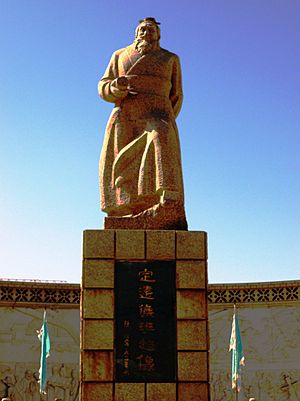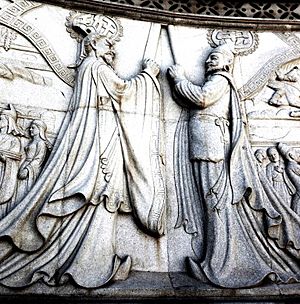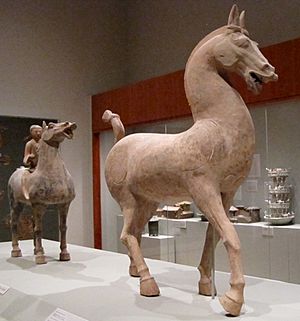Ban Chao facts for kids
Quick facts for kids Ban Chao |
|||||||||
|---|---|---|---|---|---|---|---|---|---|

Statue of Ban Chao in Kashgar
|
|||||||||
| Chinese | 班超 | ||||||||
|
|||||||||
| Zhongsheng (courtesy name) |
|||||||||
| Chinese | 仲升 | ||||||||
|
|||||||||
Ban Chao (32–102 CE) was an important Chinese military general, explorer, and diplomat during the Eastern Han Dynasty. His courtesy name was Zhongsheng. He was born in Fufeng, which is now Xianyang in Shaanxi, China.
Ban Chao came from a very famous family of historians. His father, Ban Biao, his older brother, Ban Gu, and his younger sister, Ban Zhao, were all well-known historians. They helped write the Book of Han, a major historical text about the Western Han Dynasty. As a general, Ban Chao spent over 30 years leading Han forces. He fought against the Xiongnu people and helped China control the Tarim Basin region. Because of his great efforts in protecting and managing these areas, the Han government gave him the title of Protector General of the Western Regions.
Contents
Ban Chao's Early Life
Even though Ban Chao's father was a famous historian, his family was not rich. Ban Chao worked as a copy-clerk for the government. He copied documents by hand. However, Ban Chao was very ambitious and wanted to do more than just copy papers. He was known for being strong-willed and not always following formal rules.
In 73 CE, a general named Dou Gu led a military trip to fight the Xiongnu. Ban Chao joined this trip as an assistant. He quickly showed his bravery and skill in a fight against a group of Xiongnu. Because of this, he was chosen to go on a special mission to the far-off Western Regions.
When Ban Chao and his small group arrived in Shanshan, a kingdom in the Western Regions, they found that the Northern Xiongnu had also sent their own representatives. Ban Chao and his team bravely attacked the Xiongnu envoys, killing them and sending their heads to the king of Shanshan. The king was shocked by this bold act and quickly agreed to be allies with the Han Dynasty. This was just the beginning of Ban Chao's many adventures and successes in the Western Regions.
Controlling the Tarim Basin
Ban Chao was very good at pushing the Xiongnu out of the Tarim Basin. He managed to bring many different groups of people in the Western Regions under Chinese rule during the second half of the 1st century CE. This helped to open and protect important trade routes to the west, known as the Silk Road.
Even though Ban Chao's forces were often smaller than his enemies', he was very clever. He used the disagreements among his opponents to his advantage. By 74 CE, the kingdoms of Khotan and Kashgar were under Chinese control. He also stopped new rebellions in Kashgar and Yarkand and made the Wusun people his allies.
Ban Chao was called back to the capital city of Luoyang, but he was sent back to the Western Regions four years later. This was during the time of the new emperor, Emperor Zhang. In 84 CE, Ban Chao got military help from the Kushan Empire to fight against the Kangju people. The Kangju were trying to support a rebellion by the king of Kashgar. The next year, Ban Chao used this help to attack Turpan. Eventually, Ban Chao brought the entire Tarim Basin under Chinese control.
The Kushans had helped the Chinese, so they asked for a Han princess to marry into their royal family. However, their request was turned down. In response, the Kushans marched with a large army of 70,000 soldiers against Ban Chao in 90 CE. But Ban Chao's smaller Chinese force defeated them. The Kushans then retreated and paid respect to the Chinese Empire.
In 91 CE, Ban Chao successfully brought peace to the Western Regions. He was given the important title of Protector General and was stationed in Qiuci (Kucha). Another military post was set up with 500 soldiers in the Kingdom of Nearer Jushi, inside the walls of Gaochang. In 94 CE, Ban Chao attacked and defeated Yanqi (Karashahr) again. After this, more than fifty kingdoms sent important people as a sign of their submission to the Han Dynasty.
In 97 CE, Ban Chao sent an envoy, Gan Ying, on a long journey. Gan Ying reached as far as the Persian Gulf or the Black Sea. He left the first Chinese written record about Europe.
In 102 CE, Ban Chao was 70 years old and not well, so he retired as Protector General. He returned to the capital city of Luoyang. He passed away there the next month. After Ban Chao's death, the Xiongnu's power in the Western Territories grew again. Chinese emperors did not control areas so far west again until the Tang Dynasty.
Ban Chao's Family of Historians
Ban Chao came from a family deeply involved in history. His father, Ban Biao, started writing the History of the Western Han Dynasty (also called Hanshu or The Book of Han) in 36 CE. After his father passed away, Ban Chao's older brother, Ban Gu, and his younger sister, Ban Zhao, finished the book. Ban Chao himself was likely a very important source of information for the Hanshu. He provided details about the culture and daily life in the Western Regions.
Ban Chao's youngest son, Ban Yong, also took part in military campaigns with his father. He continued to play a key military role in the Tarim Basin area into the 120s CE.
Ban Chao's Family Members
- Ban Biao (3–54 CE; his father)
- Ban Gu (32–92 CE; his older brother)
- Ban Chao (32–102 CE; himself)
- Ban Xiong (Ban Chao's oldest son)
- Ban Shi (Ban Xiong's son)
- Ban Yong (Ban Chao's youngest son)
- Ban Xiong (Ban Chao's oldest son)
- Ban Zhao (45–116 CE; Ban Chao's sister). She famously asked the emperor to let her brother return home from his faraway post.
Famous Sayings
- "Throw away your writing brush and join the military!" (投筆從戎) – This saying comes from Ban Chao's own words. He believed a brave person should aim to achieve great things in foreign lands, like famous explorers before him, instead of spending their life writing.
- "...he who does not enter the tiger's lair will never catch its cubs." (不入虎穴,不得虎子) – This is similar to the English saying, "Nothing ventured, nothing gained." It means you have to take risks to achieve big goals.
- "To die without glory is not the act of valiant men."
See also
 In Spanish: Ban Chao para niños
In Spanish: Ban Chao para niños
 | James B. Knighten |
 | Azellia White |
 | Willa Brown |



